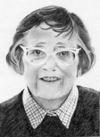 It is with great sadness that we report the passing on 6 October of our honorary president, Judith Butcher. Judith was an important influence in our professional world as a teacher, author and colleague, and she was a good friend and kind mentor to many members of the Society. We are fortunate that she has passed on her wisdom to us through her presence and her writings. Our thoughts are with her family and friends.
It is with great sadness that we report the passing on 6 October of our honorary president, Judith Butcher. Judith was an important influence in our professional world as a teacher, author and colleague, and she was a good friend and kind mentor to many members of the Society. We are fortunate that she has passed on her wisdom to us through her presence and her writings. Our thoughts are with her family and friends.
Judith Butcher will be remembered for her life-long service to UK publishing. She has done more than anyone else to establish and maintain the high editorial standards that have earned the UK publishing industry worldwide respect. Her work has undoubtedly improved the quality of published works in the UK and around the world, benefiting all types of readers by enhancing their enjoyment and understanding of the printed word.
Judith is best known as the author of Copy-editing: The Cambridge Handbook for Editors, Copy-editors and Proofreaders, referred to throughout the English-speaking world as ‘the copy-editor’s bible’. But her book is only the most tangible product of the dedication to editorial excellence that characterised her long career. Her achievements can be grouped under three headings.
Manager and trainer
During her 20 years as chief subeditor (= copy-editor) for Cambridge University Press, Judith developed the emerging craft of copy-editing into a fully fledged discipline and established it as an essential stage in the publishing process. The unreliable and costly tradition of trusting the printer’s readers to pick up errors after typesetting was replaced by a methodical system of preparing manuscripts for typesetting and eliminating errors in advance. Judith set up and managed what CUP’s former chief executive Dr Jeremy Mynott has called ‘the best subediting department of any academic publishing house in the English-speaking world’. By personal example and using the growing file of notes that eventually became the Cambridge Handbook, she trained scores of copyeditors, many of whom subsequently carried her principles and standards to other publishing houses in the UK and overseas.
Author
Judith turned her training notes into a house manual for CUP’s copy-editors and eventually into the book published by CUP as Copy-editing. It was the first copy-editing manual in English and has remained the undisputed authority in its field for over 40 years. When she retired from employment Judith kept the book up to date, making extensive revisions to keep abreast of changes in publishing technology and procedures. However, the fundamental principles that she set out remain unchanged. The book set the standard for good editing practice and disseminated it throughout the UK, the English-speaking world and even beyond: it has been translated into several languages. Copy-editing enabled standards to be maintained during the structural changes of the 1970s and 1980s, as publishing houses shed staff and turned increasingly to freelance copy-editors. Copy-editing is now predominantly a freelance occupation, and the book has provided indispensable guidance to generations of freelances without access to in-house training.
Mentor
It was to support the growing number of freelances that the Society of Freelance Editors and Proofreaders (now the Society for Editors and Proofreaders) was founded in 1988. Judith enthusiastically agreed to become its first honorary president, and in this voluntary capacity she gave the society’s officers invaluable support for many years. She attended almost every annual conference and local meeting of the society, participating fully in workshops and discussions. In particular, Judith continued to nurture new copy-editors and proofreaders, giving unstintingly of her advice and encouragement.
Judith’s personal modesty, tact and generosity informed her work in all these spheres. As a manager, she inspired as much affection as respect; as an author, her tone was friendly as well as erudite; and as president of the professional body, she underpinned its ethos of mutual support and cooperation.
From notes compiled by Naomi Laredo in 2004, with contributions from SfEP members and former colleagues of Judith (updated by Margaret Hunter 9 October 2015)
